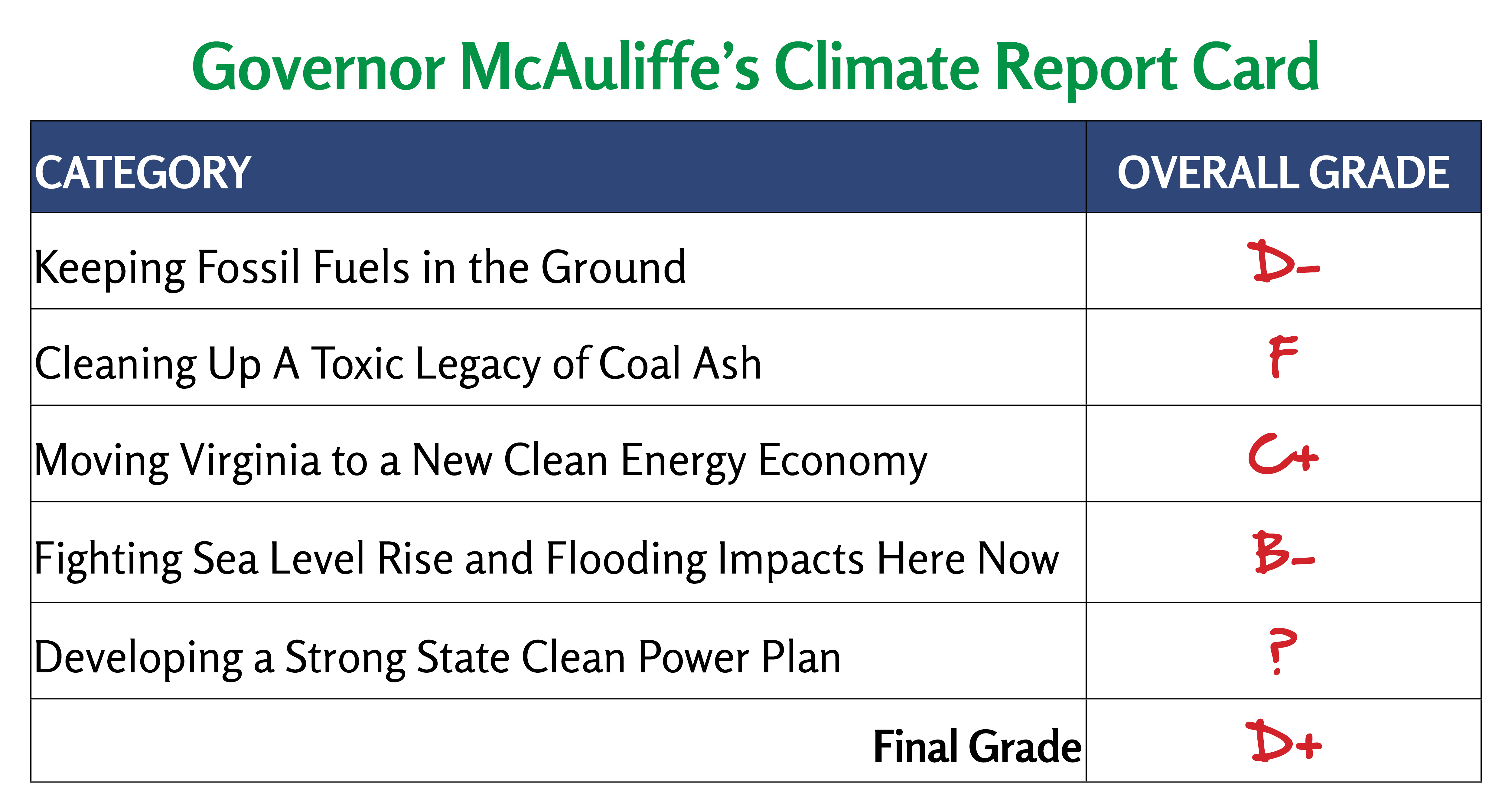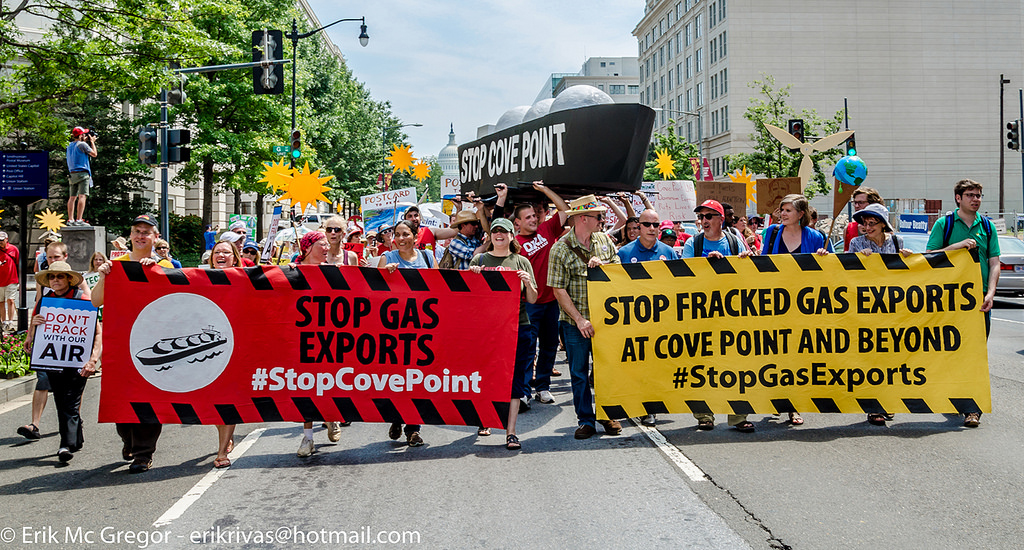Va. environmental, justice, student, and faith groups give the Governor a ‘D+’ average, weighed down by fracked-gas pipeline and coal ash failings
McAuliffe can rescue his legacy by developing a strong ‘Clean Power Plan,’ say advocates
RICHMOND—A coalition of environmental, social justice, faith, student, and community leaders issued Governor Terry McAuliffe an interim grade of “D+” today in releasing a first-of-its-kind report card on his two-year record on climate change and clean energy priorities in Virginia. The report finds that the Governor’s record so far has been a “significant disappointment” compared to his promises as a candidate and in light of the growing urgency of the climate crisis.
The report is available to view and download at: http://chesapeakeclimate.org/wp-content/uploads/2016/04/McAuliffe-Report-Card-Climate-Energy.pdf
The Chesapeake Climate Action Network, Virginia Organizing, the Virginia Student Environmental Coalition, and Interfaith Power & Light (MD.DC.NoVA) released the report, which grades Governor McAuliffe across five categories. He received the lowest marks—an “F” and “D-” respectively—for enabling toxic coal ash pollution and for promoting the largest proposed fossil fuel expansion Virginia has seen in a generation, including massive pipelines and new power plants fueled by fracked gas.
The high-pollution impact of the Governor’s support for fossil fuels threatens to overshadow his modest steps forward to spur clean energy and to address sea-level rise, the groups warn.
“When coastal Virginia is flooding at ‘normal’ high tide, we’re out of time for Governor McAuliffe’s ‘one step forward, two steps back’ approach,” said Mike Tidwell, director of the Chesapeake Climate Action Network. “Climate leadership, at its core, means keeping fossil fuels in the ground, not lobbying for decades more reliance on fracked gas and offshore oil drilling. In this regard, the Governor has failed the climate, and the health and safety of Virginians, in a major way.”
Leaders with the Potomac Riverkeeper Network and landowners fighting the Atlantic Coast and Mountain Valley Pipelines joined a tele-press conference this morning.
“Governor McAuliffe gets a double ‘F’ on coal ash just like his name. His administration has failed to protect its citizens by giving Dominion virtually a free license to pollute our rivers and drinking water. His regulatory agency has totally failed to provide any meaningful oversight of Dominion,” said Dean Naujoks, Potomac Riverkeeper. “Virginia’s chief regulator, David Paylor, has acted as a partner to Dominion, joining Dominion on a lavish golf trip before covering up a 27.5 million gallon coal ash wastewater dump into the Potomac River. Yet, the Governor has done nothing to rectify the situation.”
The groups give Governor McAuliffe an “incomplete” for his response to the federal “Clean Power Plan,” which they cite as the Governor’s biggest opportunity to transform his record.
“Virginia Organizing is committed to clean energy to create new jobs and, most importantly, to protect our precious natural resources,” said LaDelle McWhorter, Chairperson of Virginia Organizing. “It is time for Governor Terry McAuliffe to take action and for that action to be in the interest of the people of Virginia, not those who represent the big polluters.”
Governor McAuliffe has sole authority to prepare a state plan to implement the federal rules, which are designed to reduce carbon pollution from power plants. Previously, McAuliffe lobbied with the state’s largest utility company, Dominion Virginia Power, to lower Virginia’s requirements. His design of a state plan could either fully embrace clean energy or allow Dominion to invest in more polluting gas and increase carbon emissions for years to come.
“Climate change presents an urgent moral challenge to Governor McAuliffe and all people of goodwill across the Commonwealth,” said Joelle Novey, director of Interfaith Power & Light (MD.DC.NoVA). “Virginia’s faith communities are already doing everything they can to shift to cleaner power, and today we call on Governor McAuliffe to follow our lead by developing a strong ‘Clean Power Plan’ that faithfully lowers pollution using real solutions: solar, wind and efficiency. We all are called to act on climate for the sake of our neighbors and future generations.”
The report and the speakers on today’s call noted other key areas where Governor McAuliffe’s administration can rectify low marks, from requiring utilities to move toxic coal ash to modern, lined landfills to using the state’s Clean Water Act authority to block key pipeline permits.
“Governor McAuliffe has so far abandoned landowners like me, as we fight to protect our natural heritage and homes from multi-billion dollar corporations and a derelict federal agency,” said Scott Ballin, an Augusta County landowner whose home lies in the path of the Atlantic Coast Pipeline. “By joining calls for a combined regional pipeline review, and denying state water permits, Governor McAuliffe could yet become an ally.”
“The Governor’s support of fracked gas pipelines and infrastructure that blasts through venerable mountain forests, sullying streams, creeks and groundwater and destroying whole watersheds in its path to export terminals, is extremely short sighted,” said Roberta Bondurant, a long-time Bent Mountain resident and a member of POWHR (Protect Our Water, Heritage, and Rights) and Preserve Roanoke/Bent Mountain, groups fighting the proposed Mountain Valley Pipeline. “Among those in the pipeline opposition is a cadre of incredibly capable and talented environmental and energy scientists, and the Governor should avail himself of their experience and wisdom to protect our water resources. He has the opportunity, in the Clean Power Plan, to establish his legacy of renewable energy. We encourage him to seize it.”
A concern repeated throughout the report is the role of Dominion—the largest non-party campaign donor and largest climate polluter in Virginia—in influencing the McAuliffe administration’s policies.
“Students are deeply concerned that Governor McAuliffe is putting the profits of Dominion before a healthy future for all Virginians,” said Laura Cross, a second year student at the University of Virginia and a member of the Virginia Student Environmental Coalition. “We hope this report card is a wake-up call for the Governor. We need real leadership, and we need it now.”
###
Contact:
Kelly Trout, 240-396-2022, kelly@chesapeakeclimate.org
Amanda Pohl, 804-337-1912, amanda@virginia-organizing.org


